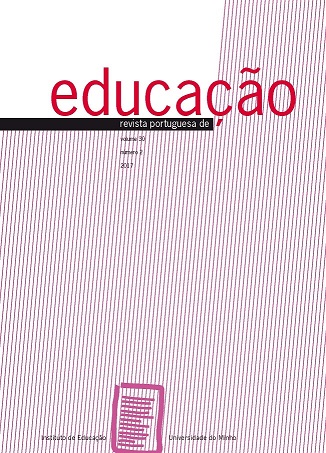Universos do conhecimento. Reflexões sobre a investigação narrativa na educação
DOI:
https://doi.org/10.21814/rpe.11937Resumo
O presente texto tem como objetivo oferecer ao leitor alguns apontamentos dos conceitos que envolvem a temática da investigação narrativa em educação e na pesquisa qualitativa. Quando se discute sobre esta modalidade de fazer investigação, há sempre dúvidas quanto a sua validade, geradas pela forte tradição positivista que predomina desde o nascimento do método científico. Com a intenção de complexificar a discussão sobre a natureza da pesquisa qualitativa, educativa e narrativa, este trabalho apoia-se em autores que problematizam os termos experiência, tempo, espaço, palavra e investigação narrativa, a partir da investigação e da literatura. Nas conclusões faz-se uma reflexão sobre a investigação narrativa como um giro metodológico qualitativo que possibilita uma rica geração de dados para o entendimento e a interpretação de níveis mais profundos da complexa subjetividade humana e da prática educativa.
Palavras-chave: Experiência; Tempo-Espaço; Palavra; Investigação narrativa
ABSTRACT
This text aims to offer the reader some notes about concepts involving the theme of narrative research in education and in qualitative research. When discussing this mode of doing research, there are always doubts about its validity, generated by a strong positivist tradition that prevails since the birth of the scientific method. With the intention to deepen the discussion on the nature of qualitative research, of an educational and narrative nature, this work is based on literary analysis and on authors who problematize the terms experience, time, space, word and narrative research. A reflection on the methodological qualities of narrative research is made in the conclusions, as a qualitative methodology that makes possible a rich generation of data for understanding and interpreting deeper levels of the complex human subjectivity and of the educative practice.
Keywords: Experience; Time-Space; Word; Narrative research
Downloads
Referências
Bakhtin, M. M. (1982). Estética de la creación verbal. México: Siglo Veintiuno Editores.
Benjamin, W. (1985). O narrador. In W. Benjamin, Obras Escolhidas. Vol. I: Magia e técnica, arte e política (pp. 197-221). São Paulo: Brasiliense.
Bogdan, R., & Biklen, S. (1994). Investigação qualitativa em educação. Uma introdução à teoria e aos métodos. Porto: Porto Editora.
Borges, J. L. (2012). El libro de arena. México: Alianza.
Catani, V. (Produtora), & Caffé, E. (Realizadora). (2003). Narradores de Javé [Filme]. Brasil: Bananeira Filmes.
Connelly, F. M., & Clandinin, D. J. (1995). Relatos de experiencia y investigación narrativa. In J. Larrosa, R. Arnaus, V. Ferrer, N. Pérez de Lara, F. M. Connelly, D. J. Clandinin, & M. Greene, Déjame que te cuente. Ensayos sobre narrativa y educación (pp. 11-59). Barcelona: Laertes.
Flammarion, C. (1888/2017). L’atmosphère: Météorologie populaire [1888]. Bibliothèque Nationale de France. Disponível em: http://gallica.bnf.fr/ark:/12148/ bpt6k408619m (consultado em janeiro de 2017).
Gatti, B. (2007). A construção da pesquisa em educação no Brasil. Brasília: Líber Livro Editora.
Guimarães, S. (2006). Aprender a contar, a ouvir, a viver: As narrativas como processo de formação. In I. Alencastro (Org.), Técnicas de ensino. Novos tempos, novas configurações (pp. 137-163). Campinas: Papirus.
Guimarães, S., & Guimarães, I. (2011). Narradores de Javé e narrativas de professores: Espaço, tempo e identidade. In M. Silva & A. F. Ramos (Orgs.), Ver História. O ensino vai aos filmes (pp. 247-265). São Paulo: Hucitec.
Larrosa, J. (2002). Notas sobre a experiência e o saber da experiência. Revista Brasileira de Educação, 19, 20-28.
Rogers, C. (1991). El proceso de convertirse en persona. Mi técnica terapéutica. Barcelona: Paidós.
Santo Agostinho (1973). Confissões. De magistro (Do mestre). São Paulo: Editora Abril.
Severino, A. J. (2002). Pós-graduação e pesquisa: O processo de produção e de sistematização do conhecimento no campo educacional. In L. Bianchetti & A. M. N. Machado (Orgs.), A bússola do escrever (pp. 67-87). São Paulo: Cortez/Editora da UFSC.
Downloads
Publicado
Como Citar
Edição
Secção
Licença
1. Autores conservam os direitos de autor e concedem à revista o direito de primeira publicação, com o trabalho simultaneamente licenciado sob a Licença Creative Commons Attribution 4.0 CC-BY-SA que permite a partilha do trabalho com reconhecimento da autoria e publicação inicial nesta revista;
2. Autores e autoras têm autorização para assumir contratos adicionais separadamente para distribuição não-exclusiva da versão do trabalho publicada nesta revista (ex.: depositar em repositório institucional ou como capítulo de livro), com reconhecimento de autoria e publicação inicial nesta revista;
3. Autores e autoras têm permissão e são estimulado/as a publicar e distribuir o seu trabalho online (ex.: em repositórios institucionais ou na sua página pessoal), já que isso pode aumentar o impacto e a citação do trabalho publicado (Veja O Efeito do Acesso Livre).
Esta obra está licenciada sob uma Licença Creative Commons - Atribuição Compartilhamento pela mesma Licença Internacional 4.0




















